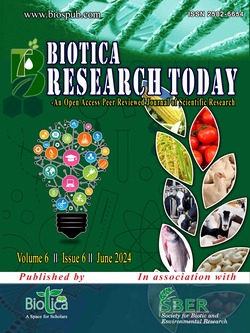
Modern Methods of Irrigation and Drainage for Maintaining the Soil Health
Mayur Adawadkar*
College of Agricultural Engineering and Technology, Kashti, Malegaon, Maharashtra (423 105), India
Vinayak Paradkar
College of Agricultural Engineering and Technology, Kashti, Malegaon, Maharashtra (423 105), India
DOI: NIL
Keywords: Drainage, Drip irrigation, Soil health, Sprinkler irrigation
Abstract
In the short and long term, soil health can be improved and productivity and profitability can be increased by employing management strategies that take care of the soil. The greatest numbers of products are produced at the lowest cost in a fully functional soil. Profitability can only be maximised by optimising soil health. If soil is mistreated, it will not serve your needs. Managing soil health and enhancing its function primarily involves creating and maintaining an environment conducive to the diverse organisms that make up the soil food web. This can be accomplished by reducing soil disruption, growing a diverse range of plant species, keeping live plants in the soil as much as possible, ensuring the soil remains covered at all times, and employing modern irrigation and drainage methods.
Downloads
not found
Reference
Pandey, A.C., Singh, S.K., Nathawat, M.S., Saha, D., 2013. Assessment of surface and subsurface waterlogging, water level fluctuations and lithological variations for evaluating groundwater resources in Ganga Plains. International Journal of Digital Earth 6(3), 276-296. DOI: https://doi.org/10.1080/17538947.2011.624644.
Salmon, J.M., Friedl, M.A., Frolking, S., Wisser, D., Douglas, E.M., 2015. Global rain-fed, irrigated and paddy croplands: A new high-resolution map derived from remote sensing, crop inventories and climate data. International Journal of Applied Earth Observation and Geoinformation 38, 321-334. DOI: https://doi.org/10.1016/j.jag.2015.01.014.
